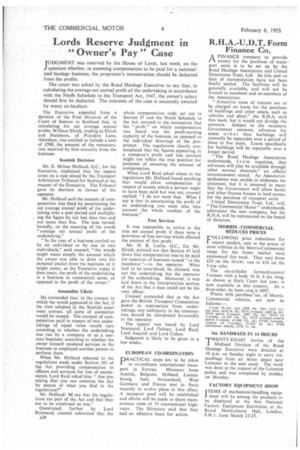Lords Reserve Judgment in "Owner's Pay" Case
Page 30

If you've noticed an error in this article please click here to report it so we can fix it.
TUDGMENT was reserved by the House of Lords, last week, on the .) question whether, in assessing compensation to be paid for a nationalized haulage business, the proprietor's remuneration should be deducted from the profits.
The court was asked by the Road Haulage Executive to say that, in calculating the average net annual profit of the undertaking in accordance with the Ninth Schedule to the Transport Act, 1947, the owner's salary should first be deducted. The outcome of the case is anxiously awaited by many ex-hauliers.
The Executive appealed from a decision of the First Division of the Court of Session in Scotland that, in calculating his net average annual profits, William Elrick, trading as Elrick and Hutcheon, of Pittodrie Lane, Aberdeen, was entitled to include a sum of £700, the amount of the remuneration received by him annually from the business.
Scottish Decision Mr. E. Milner Holland, Q.C., for the Executive, explained that the appeal arose on a case stated by the Transport Arbitration Tribunal for Scotland at the request of the Executive. The Tribunal gave its decision in favour of the operator. Mr. Holland said the amount of compensation was fixed by ascertaining the net average annual profit of the undertaking over a past period and multiplying the figure by not less than two and not more than live. The case turned, broadly, on the meaning of the words "average net annual profit of the undertaking."
" In the case of a business carried on by an individual or by one or two individuals," said counsel, "the words might mean simply the amount which the owner was able to draw into his personal pocket from the business, or it might mean, as the Executive argue it does mean. the profit of the undertaking in a business or commercial sense, as opposed to the profit of the owner."
Anomalies Likely
He contended that, in the context in which the words appeared in the Act, if the view adopted in the Scottish court were correct, all sorts of anomalies would be caused. The amount of compensation paid in respect of two undertakings of equal value would vary according to whether the undertaking was run by a company or as a oneman business: according to whether the owner himself rendered services in the business or employed another person to perform them.
When Mr. Holland referred to the regulations made under Section 101 of the Act providing compensation to officers and servants for loss of emoluments, Lord Reid asked him: "Are you saying that you can construe the Act by means of what you find in the regulations?"
Mr. Holland: '14 say that the regulations are part of the Act and that they are to be construed as one."
Questioned further by Lord Normand, counsel submitted that the A28 whole compensation code, set out in Section 47 and the Ninth Schedule to the Act, pointed to the conception that the " profit " on which compensation was based was the profit-earning capacity of the business, as opposed to the individual drawings of the proprietor. The regulations clearly contemplated that the figures appearing in a company's profit and loss account might not reflect the true position for purposes of assessing the amount of compensation.
When Lord Reid asked where in the regulations Mr. Holland found anything that would allow compensation in respect of money which a servant ought to have been paid but was not, counsel replied: "I do not want that. What say is that in ascertaining the profit of an undertaking you must take into account the whole conduct of the business."
Free Services
It was impossible to arrive at the true net annual profit if there were a provision of free services which affected the amount of that profit.
Mr. H. R. Leslie, Q.C., for Mr. Elrick, pointed out that Section 47 laid down that compensation was to be paid for cessation of business caused " to the transferor "—to the operator. What had to be consldered, he claimed, was not the undertaking, but the operator of the undertaking. Moreover, it was laid down in the interpretation section of the Act that a man could not be his own officer.
Counsel contended that as the Act gave the British Transport Commission power to expropriate from undertakings, any ambiguity in the construction should be interpreted favourably to the operator.
The appeal was heard by Lord Normand, Lord Oaksey, Lord Reid, Lord Asquith and Lord Cohen.
Judgment is likely to be given in a few weeks.
EUROPEAN CO-ORDINATION
DRACTICAL steps are to be taken
to co-ordinate international transport in Europe. Ministers from Austria, Belgium, Holland, Luxembourg, Italy, Switzerland, West Germany and France met in Paris recently to evolve plans to this effect. A transport pool will be established and efforts will be made to share maintenance costs of 19 international highways. The Ministers said that they had an effective basis for action.




























































































